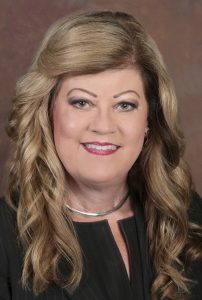This year marks the 15th anniversary of Augusta University College of Nursing’s Doctor of Nursing Practice (DNP) program. The DNP program, created in 2005, was the first in the state of Georgia and graduated its first class in 2006. The program started with only a few students but now has 185 enrolled.

Dr. Pamela Cook, interim associate dean of academic affairs and professor for the College of Nursing, was one of the program’s first graduates.
Her story began in the rural part of Aiken, South Carolina, where many of her peers didn’t have a college education.
“I did not think about attending college or know that I could until I was 17,” Cook said. With encouragement from her mother and family, she then went to study at a local community college to acquire her associate’s degree in nursing.
Cook then decided to pursue her Bachelor of Science in Nursing from the University of South Carolina.
Determined to further her education, she traveled to Charleston to attend the Medical University of South Carolina to obtain her Master’s of Science in Nursing Administration.
Her most recent degree was then acquired at Augusta University from the DNP program at the College of Nursing.
“Prior to Dr. Lucy Marion joining the CON as dean in 2004, I was researching a variety of doctoral programs. Dr. Marion spearheaded the inception of AU’s DNP program and she thought I’d be a great candidate. Once the program was established in 2005, I applied and was accepted in the inaugural class,” said Cook.
During her enrollment in the DNP program, which was at that time housed under the Medical College of Georgia, Cook and others collaborated on Cook’s DNP project, Shared Governance: Restructuring the Future. Together they implemented the framework, principles, and elements from the shared governance model at the university.

“The objective of implementing shared governance was to increase job satisfaction, enhance professional growth, optimize patient care outcomes and give control of nursing practice to practitioners, which demonstrated a positive correlation between nurse satisfaction, recruitment, retention and patient care outcomes,” Cook said.
Since receiving her DNP, Cook has advanced in rank to assistant dean of student affairs and interim associate dean for academic affairs at the College of Nursing.
“My past and current experiences, along with the DNP program, have provided me with the knowledge and skills to help our students in their most trying times,” Cook said.
She has been awarded eight Health Resources and Services Administration (HRSA) grants from the Department of Health and Human Services since obtaining her DNP degree. “The grants have benefited both our students, the college and the university,” she said.
Cook sees a bright future ahead for the DNP program.
“We are already on the path for the DNP degree to become the terminal degree for advanced clinical practice and leadership,” she said, adding that the number of enrolled students in the DNP program at the College of Nursing continues to grow. “More and more nurses see the value and need for a practice doctorate degree, so applications and graduates are increasing each year.”
Cook shares her story at recruitment events to encourage students to keep pushing no matter the hardships they must endure.
“At 16,” Cook reflects, “you could never have convinced me that I would ever obtain all that I have in my career. I am very humbled by it all and look at my degrees on the wall to see if they really do have my name on them.”
The DNP program is available to students with a post-BSN or post-MSN degree. The program includes seven different degree tracks. The post-BSN programs are adult-gerontology acute care nurse practitioner, family nurse practitioner, pediatric nurse practitioner, psychiatric mental health nurse practitioner, and nursing anesthesia. The post-MSN programs are post-master’s DNP, nurse executive, and post-master’s certificates.
This doctoral-level education provides nurses the clinical and management expertise to improve health care outcomes. Please visit the College of Nursing website to learn more about the DNP program and requirements to enroll.
 Augusta University
Augusta University




